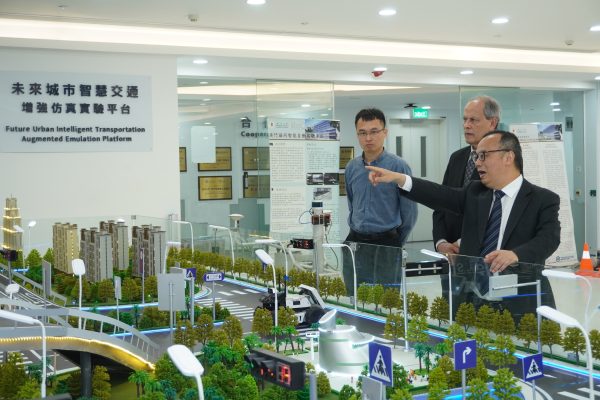News Express: IEEE president shares insights on carbon reduction with UM faculty members and students
新聞快訊:IEEE主席與澳大師生探討“碳減排”

Saifur Rahman參觀澳大智慧城市物聯網國家重點實驗室
Saifur Rahman visits State Key Laboratory of Internet of Things for Smart City
IEEE主席與澳大師生探討“碳減排”
國際電氣與電子工程師協會(IEEE)主席暨首席執行官Saifur Rahman到訪澳門大學,與澳大研究人員討論學科發展,並於“大學講壇”就“科技工作者在促進氣候可持續發展中的作用”為題進行演講,探討 “碳減排”對環境可持續發展的重要作用,以及如何構建相關的科學技術體系。
講座上,宋永華致辭時表示,澳大積極推動低碳減排領域的科研發展,智慧城市物聯網國家重點實驗室開展以物聯網、大數據、人工智能為基礎的智慧城市綜合能源系統低碳運行優化與安全防護理論與技術研究;應用物理及材料研究院開展新能源採集、高密度能量存儲、二氧化碳轉化等基礎理論與技術研究。澳大以推動建設清潔、低碳、安全、高效的智慧能源體系為目標,致力提出對建設智慧城市和可持續環境具有根本意義的共同理論和系統,為服務“雙碳”戰略目標與氣候可持續發展作出新的更大貢獻。
Saifur Rahman分析,要實現“碳減排”這一全球共同目標,需要工業化國家與新興經濟體合作,共同規劃出一套包括低碳發電、儲能、需求側管理及能效提升技術在內的系統性解決方案。他強調科技工作者在推動氣候可持續發展方面的重要性,並分享減緩和適應氣候變化相關的當前和新興技術。講座還設問答及交流環節,講者與澳大師生及線上線下與會者交流互動,討論氣氛熱烈。
其後,Saifur Rahman參觀澳大應用物理及材料工程研究院、智慧城市物聯網國家重點實驗室、模擬與混合信號超大規模集成電路國家重點實驗室以及認知與腦科學研究中心。宋永華向其介紹澳大的歷史沿革、科研佈局、校園建設和發展方向。Saifur Rahman讚揚澳大在智慧城市、低碳能源等領域的研究成果,並就學科發展、未來規劃等話題與澳大研究人員進行深入的交流和討論,期望雙方能加強交流合作,充分發揮彼此優勢,共同為促進氣候可持續發展事業作出貢獻。
IEEE是全球最大的非營利性專業技術學會,在國際電氣與電子科技創新與合作交流方面,發揮重要作用。Saifur Rahman是國際知名的能源與電力科學家和學術領袖,現任IEEE主席、維吉尼亞理工大學高級研究中心創始主任、Joseph R. Loring電氣和電腦工程冠名教授,還領導維吉尼亞理工大學能源和全球環境中心。另外,他也是 IEEE 終身會士和 IEEE 千禧獎章獲得者,曾任IEEE電力與能源協會(IEEE PES)主席、IEEE Electrification Magazine及 IEEE Transactions on Sustainable Energy 的創刊主編。
欲瀏覽官網版可登入以下連結:
https://www.um.edu.mo/zh-hant/news-and-press-releases/presss-release/detail/55680/
IEEE president shares insights on carbon reduction with UM faculty members and students
Saifur Rahman, president and CEO of the Institute of Electrical and Electronics Engineers (IEEE), visited the University of Macau (UM) and exchanged ideas with researchers at the university on disciplinary development. Rahman also gave a talk titled ‘Technologists’ Role in Addressing Climate Sustainability’ as part of the University Lecture Series to explore the importance of carbon reduction to the sustainable development of the environment and how to build a relevant scientific and technological system.
In his welcome speech at the talk, UM Rector Yonghua Song said that UM is committed to promoting research to realise carbon reduction. For instance, UM’s State Key Laboratory of Internet of Things for Smart City has been carrying out studies on theories and technologies that can benefit the integrated energy system of smart cities to achieve low-carbon operation, optimisation, and safety prevention based on the Internet of Things, big data, and artificial intelligence. In addition, UM’s Institute of Applied Physics and Materials Engineering has been conducting research on fundamental theories and technologies for new energy harvesting, high-density energy storage, and carbon dioxide conversion. To build a clean, low-carbon, safe, and efficient smart energy system, UM aims to put forward theories and systems that are of fundamental importance to contribute to smart city development and sustainability, which will also serve the ‘dual carbon’ goal of China and contribute to climate sustainability.
During the talk, Rahman discussed the global objective of achieving carbon reduction and how it requires cooperation between industrialised countries and emerging economies to create a systematic solution that includes advanced low-carbon power generation, energy storage, demand-side management, and energy efficiency improvement technologies. He also stressed the importance of technology practitioners to the promotion of climate sustainability, and shared current and emerging technologies for mitigating and adapting to climate change. The lecture also included a Q&A and discussion session, where the speaker interacted with UM Faculty members, students, and other participants virtually and in person.
After the lecture, Rahman visited UM’s Institute of Applied Physics and Materials Engineering, State Key Laboratory of Internet of Things for Smart City, State Key Laboratory of Analog and Mixed-Signal VLSI, and Centre for Cognitive and Brain Sciences. During the tour, Song gave the guest an introduction of UM’s development history, research layout, campus facilities, and development direction. Rahman spoke highly of the research achievements attained by UM in the fields of smart city and low-carbon energy. He exchanged ideas with researchers at UM on disciplinary development and future planning, and expressed hope to strengthen cooperation with them and jointly contribute to climate sustainability.
IEEE is the world’s largest non-profit professional technical society and plays an important role in international innovation and cooperation in electrical and electronic technology. Rahman is an internationally renowned scientist and academic leader in the fields of energy and power. He currently serves as the president of IEEE, as well as the founding director of the Advanced Research Institute, the Joseph R. Loring Professor of Electrical and Computer Engineering, and the leader of the Center for Energy and the Global Environment at Virginia Tech. In addition, he is an IEEE Life Fellow and a recipient of the IEEE Millennium Medal. He was the president of the IEEE Power and Energy Society (PES) as well as the founding editor-in-chief of IEEE Electrification Magazine and IEEE Transactions on Sustainable Energy.
To read the news on UM’s official website, please visit the following link:
https://www.um.edu.mo/news-and-press-releases/press-release/detail/55680/